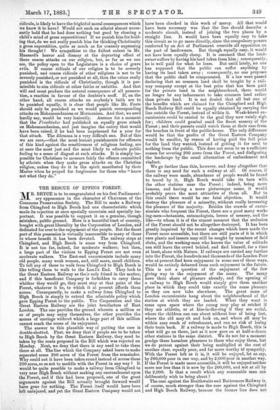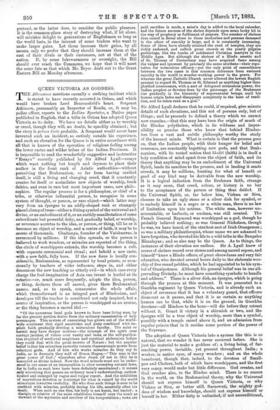THE RESCUE OF EPPING FOREST.
MR. BRYCE is to be congratulated on his first Parliament- ary appearance in the character of Chairman of the Commons Preservation Society. The Bill to make a Railway from Chingford to High Beech had one characteristic which made its rejection at once specially uncertain and specially im- portant. It was possible to support it on a genuine, though mistaken, public ground. Here is a beautiful tract of country, bought with great liberality by the Corporation of London, and dedicated for ever to the enjoyment of the people. But the finest part of this possession is virtually inaccessible to many of those to whose benefit it has been devoted. The railway stops at Chingford, and High Beech is some way from Chingford. It is not too far, indeed, for moderate walkers; but then, a large part of the visitors to Epping Forest are not even moderate walkers. The East-end excursionists include many old people, many weak women, and, still more, small children. To tell any of these to walk from Chingford to High Beech is like telling them to walk to the Land's End. They look to the Great Eastern Railway as the:r only friend in the matter, and if this beneficent Company is forbidden to carry them whither they would gá, they must stay at that point of the Forest, whatever it be, to which it at present affords them access. Consequently, to make a railway from Chingford to High Beech is simply to extend the admirable policy which gave Epping Forest to the public. The Corporation and the Great Eastern Railway are the joint benefactors of East London. The one provides the ground wherein a million or so of people may enjoy themselves, the other provides the means of •carriage without which a large part of this million cannot reach the scene of its enjoyment.
The answer to this plausible way of putting the case is double-shotted. First, we deny that if people are to be taken to High Beech by the Great Eastern Railway, they need be taken by the route proposed in the Bill which was rejected on Monday. Next, we deny that there is any need to take them there at all. The line which the Company asked leave to make separated some 200 acres of the Forest from the remainder. Why could not it have been taken round instead of across these 200 acres, so as not to meddle with the Forest in any way ? It would be quite possible to make a railway from Chingford to very near High Beech without making any encroachment upon the Forest, and if this had been proposed, one of the great arguments against the Bill actually brought forward would have gone for nothing. The Forest itself would have been left uninjured, and yet the Great Eastern Company would not have been checked in this work of mercy. All that would have been necessary was that the line should describe a. moderate circuit, instead of joining the two places by a straight line. It would have been equally easy to take this circuit as to go more directly, since the compulsory powers conferred by an Act of Parliament override all opposition on the part of landowners. But though equally easy, it would not have been equally cheap. It is assumed that the land- owner suffers by having his land taken from him; consequently, he is well paid for what he loses. But until lately, no one has supposed that the public can suffer anything by having its land taken away ; consequently, no one proposes that the public shall be compensated. If a law were passed declaring that no common land shall be bought by a rail- way company except at the best price that has been paid for the private land in the neighbourhood, there would no longer be any inducement to take common land rather than private land. It is not denied that all but one of the benefits which are claimed for the Chingford and High Beech Railway Bill could be equally obtained by carrying the line outside the Forest, instead of within it. Weak-kneed ex- cursionists could be carried to the goal they now vainly sigh for ; children could gambol amid the finest scenery of the Forest ; and their parents could watch them at their ease from the benches in front of the public-house. The only difference would be that the profits of the Great Eastern Company would be smaller, by reason of having paid the full price for the land they wanted, instead of getting it for next to nothing from the public. This does not seem to us a sufficient reason for severing 200 acres from the Forest, and disfiguring the landscape by the usual alternation of embankment and viaduct.
We go farther than this, however, and deny altogether that there is any need for such a railway at all. Of course, if the railway were made, abundance of people would be found to travel by it. High Beech would take its turn with the other stations near the Forest ; indeed, being more famous, and having a more picturesque name, it would probably prove the most attractive of them all. But to this result there would be one fatal objection. It would destroy the pleasure of a minority, without really increasing the pleasure of the majority. Besides the crowds of excur- sionists who frequent the Forest, there are a good many work- ing-men—botanists, entomologists, lovers of scenery, and the like—to whom it is of the utmost moment that the seclusion of the Forest should not be altogether destroyed. It has been greatly impaired by the recent changes which have made the Forest more accessible, but there are still parts of it in which rare plants and insects may still be sought by members of field clubs, and the working-man who knows the value of solitude can still leave the crowd behind, and find himself, for a time at least, alone with Nature. If railways are carried any further into the Forest, the hundreds and thousands of the London Poor who at present find keen enjoyment in some one of these ways, would be entirely debarred from such enjoyment in the future. This is not a question of the enjoyment of the few giving way to the enjoyment of the many. The many have their share of pleasure already, and the opening of a railway to High Beech would simply give them another place in which they could take exactly the same pleasure as they can now take elsewhere. The great mass of London excursionists hang about the neighbourhood of the station at which they are landed. What they want ía some open space where the young may play at cricket if they are athletic, or at kiss-in-the-ring if they are social, where the children can run about without fear of being lost,
where the old may sit and look on and where all may be
within easy reach of refreshment, and run no risk of losing their train back, If a railway is made to High Beech, this is what will go on there, just as it now goes on at half-a-dozen other stations in the same district. We do not for a moment grudge these harmless pleasures to those who enjoy them, but we do protest against their being multiplied at the cost of another class, equally poor, and far more worthy bf sympathy. With the Forest left as it is, it will be enjoyed, let us say, by 200,000 poor in one way, and by 2,000 poor in another way. If the Forest is made more accessible, it will be enjoyed neither more nor less than it is now by the 200,000, and not at all by the 2,000. Is that a result which any reasonable man can deliberately wish to bring about ?
The case against the Braithwaite and Buttermere Railway is, of course, much stronger than the case against the Chingford and High Beech Railway, because the former line does not pretend, as the latter does, to consider the public pleasure. It is the common-place story of destroying what, if let alone, will minister delight to generations of Englishmen so long as the world lasts, in the interest of some traders who want to make larger gains. Let them increase their gains, by all means, only we prefer that they should increase them at the cost of their rivals or their customers, not at that of the nation. If, by some lukewarmness or oversight, the Bill should ever reach the Commons, we hope that it will meet the same fate as that which Mr. Bryce dealt out to the Great Eastern Bill on Monday afternoon.



































 Previous page
Previous page